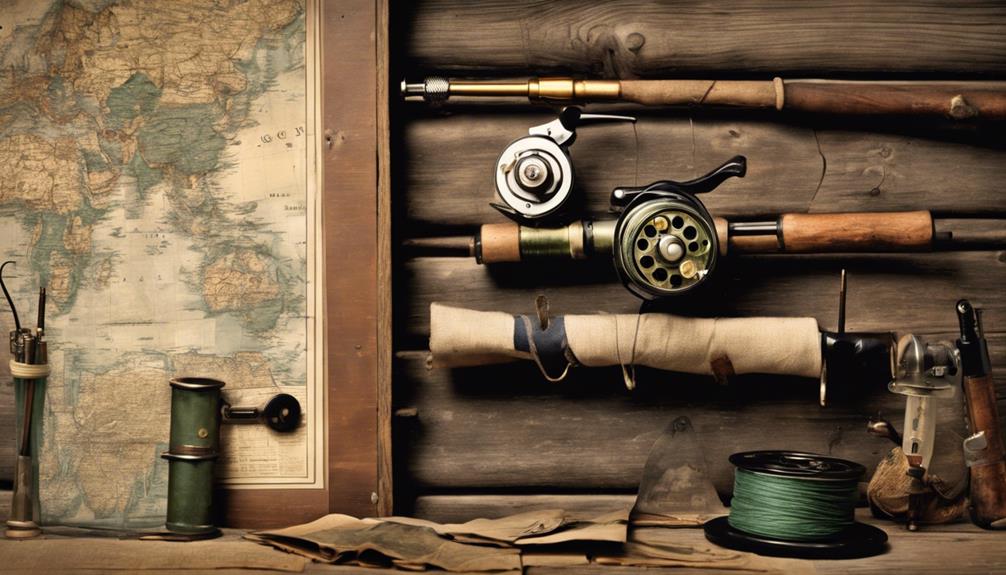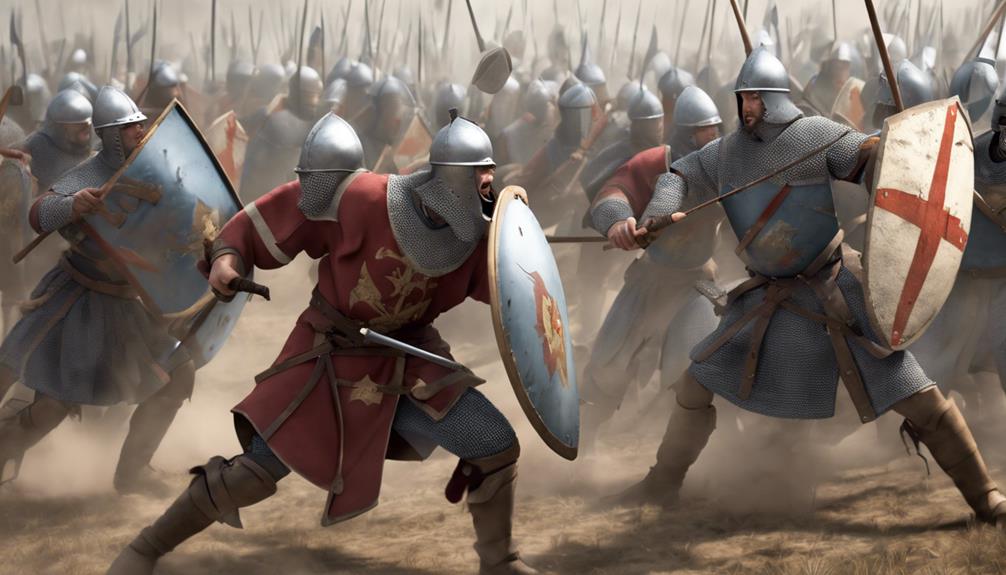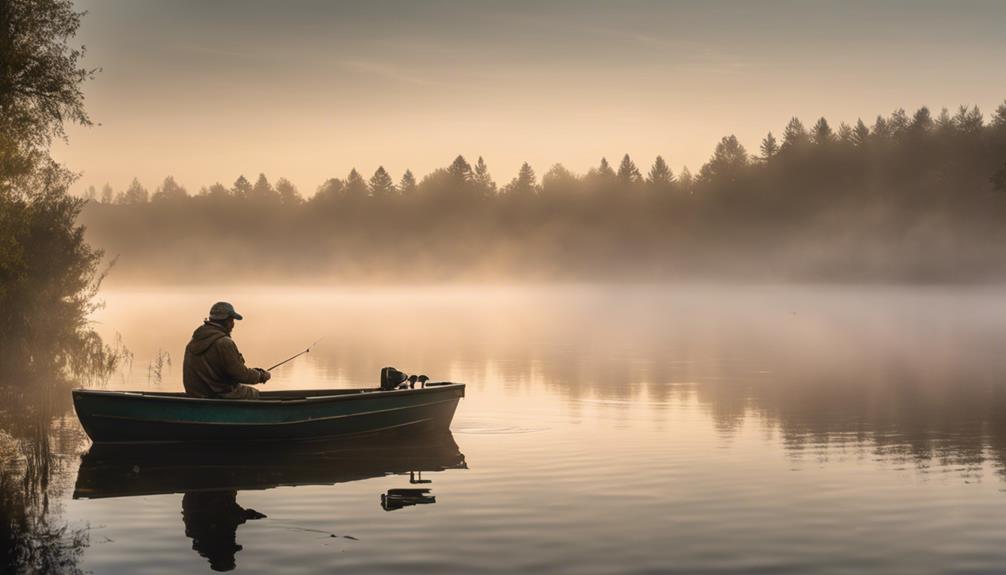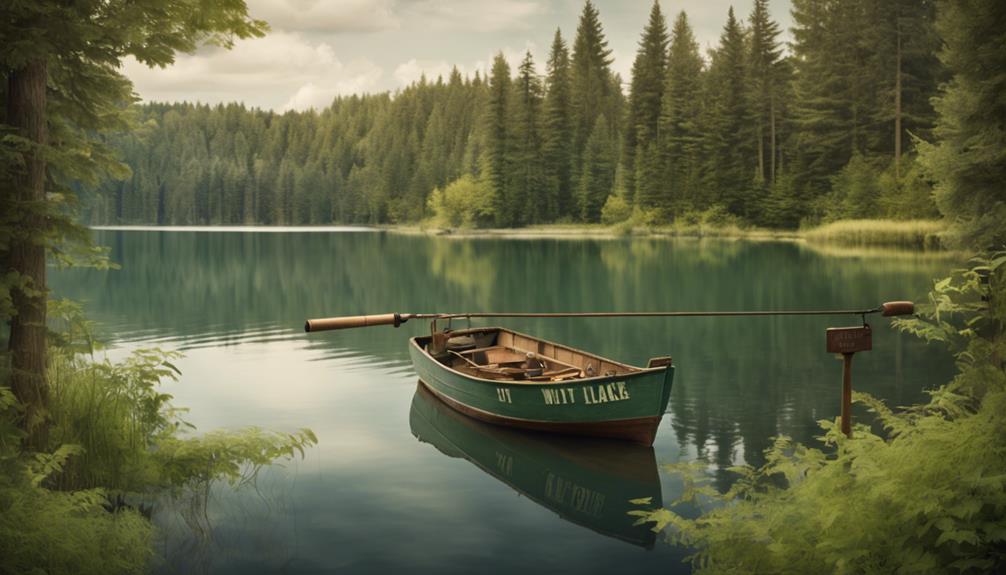As you contemplate the serene act of casting a line into a still body of water, have you ever wondered about the intricate historical tapestry that angling has woven through civilizations over centuries?
The evolution of angling practices, from its early humble beginnings to its prominent role in art, literature, and social interactions, offers a fascinating glimpse into the cultural significance of this seemingly simple activity.
Stay tuned to uncover the profound impact angling has had on various facets of society, leaving a lasting legacy that continues to shape our perceptions and values.
Early Origins of Angling
If you're curious about the roots of angling, delve into the ancient practice that laid the foundation for this beloved pastime. Ancient techniques in angling date back centuries, with early civilizations employing various methods to catch fish for sustenance and cultural practices. Fishing with rudimentary tools such as spears, hooks made from bone or wood, and simple nets were common among ancient societies worldwide. These ancient techniques not only served as a means of survival but also held cultural significance, shaping beliefs, traditions, and even societal structures.
In many ancient cultures, fishing wasn't just a way to procure food but also a symbol of strength, patience, and connection to nature. The act of fishing often carried spiritual meanings, with rituals and ceremonies associated with successful catches. For example, in some societies, a successful fishing trip was seen as a blessing from the gods, leading to elaborate ceremonies to honor the fish and show gratitude for the bounty provided.
As angling evolved over time, these early practices laid the groundwork for the development of more sophisticated fishing techniques and equipment. The cultural significance of angling continued to grow, influencing art, literature, and even social hierarchies. Understanding the ancient origins of angling provides insight into its enduring popularity and the deep cultural impact it has had throughout history.
Angling in Ancient Civilizations
Ancient civilizations around the world engaged in angling as a fundamental practice for sustenance and cultural significance. Fishing techniques in these ancient civilizations were diverse and innovative, showcasing the early anglers' ingenuity and resourcefulness. Here are some key points to highlight the role of angling in ancient civilizations:
- Techniques: Ancient civilizations developed various fishing techniques to catch fish for food and trade. From using spears and harpoons to nets and traps, early anglers honed their skills to adapt to different environments and fish species.
- Cultural Significance: Angling held profound cultural significance for early civilizations. It wasn't merely a means of obtaining food but also played a vital role in rituals, art, and storytelling. Fish became symbols of fertility, luck, and abundance in many ancient cultures.
- Innovation: Early anglers in ancient civilizations were pioneers in developing fishing tools and methods. They crafted fishing hooks from bones, stones, and wood, demonstrating their craftsmanship and knowledge of local resources. Additionally, the use of boats and fishing weirs showcased their advanced understanding of aquatic ecosystems.
Understanding how angling was intertwined with the daily lives and belief systems of ancient civilizations provides valuable insights into the historical cultural impact of this timeless practice.
Angling Traditions in Medieval Times
During medieval times, angling traditions evolved significantly, reflecting the changing societal norms and technological advancements of the era. Angling in the medieval period wasn't just a means of sustenance but also a popular recreational activity. Fishermen utilized various medieval techniques, such as handlining, netting, and the creation of early fishing reels using wood and bone. These techniques were essential for catching fish in rivers, lakes, and even the surrounding seas, contributing to the livelihood of many communities.
Angling held historical significance during the medieval times as it became intertwined with religious practices. Fishing restrictions during certain religious periods, like Lent, led to the development of specific angling methods that allowed for a successful catch while adhering to religious guidelines. Additionally, medieval artwork and literature often depicted scenes of fishing, showcasing the cultural importance of angling during that period.
Moreover, angling traditions in medieval times weren't limited to just catching fish. Fishing tournaments and competitions emerged as a form of entertainment and social gatherings, bringing together people from different walks of life. These events further elevated the status of angling in medieval society, highlighting its role as both a practical skill and a leisurely pastime.
Angling's Role in Renaissance Art
Exploring the intertwining of angling with artistic expressions during the Renaissance reveals a rich tapestry of creativity and cultural significance. In Renaissance art, angling played a prominent role, influencing the works of renowned artists and contributing to the symbolism and technique of the period.
Here's a list to help you better understand angling's impact on Renaissance art:
- Symbolism: Angling was often depicted in Renaissance art as a symbol of patience, skill, and the harmony between humans and nature. Paintings featuring anglers often carried deeper meanings related to contemplation and the passage of time.
- Technique: Artists during the Renaissance period used angling scenes to showcase their technical prowess. The intricate details of fishing rods, flowing water, and fish weren't only a testament to the artist's skill but also added layers of realism to their works.
- Integration into Narrative: Angling scenes were seamlessly integrated into larger narratives in Renaissance art. Whether as a background element or a central focus, these depictions added depth and complexity to the stories being told through the artwork.
Angling's Influence on Literature
Angling has woven its influence into the literary world, shaping narratives and characters with its timeless allure and symbolism. Angling in poetry often serves as a metaphor for life's struggles and triumphs. Poets use the act of fishing to symbolize the journey of self-discovery, the patience required to achieve one's goals, and the interconnectedness of humans with nature. Through the imagery of casting lines and reeling in catches, poets evoke themes of perseverance, hope, and the passage of time.
In the realm of fiction, fishing is frequently utilized to develop characters and advance plotlines. Whether it's a protagonist finding solace by a tranquil river or a crucial conversation taking place during a fishing trip, authors integrate angling to add depth to their storytelling. Fishing scenes can symbolize introspection, contemplation, or even conflict resolution between characters. The act of fishing becomes a literary device that not only paints vivid scenes but also conveys deeper meanings that resonate with readers.
Angling as a Social Activity
As angling intertwines with social interactions, its presence extends beyond solitary contemplation or literary embellishments. Engaging in angling fosters community bonding and provides relaxation therapy, offering a myriad of benefits beyond just catching fish. Here's how angling serves as a social activity:
- Community Bonding: Angling brings people together, creating a sense of camaraderie among enthusiasts. Whether it's sharing fishing tips, exchanging stories about the one that got away, or participating in angling competitions, the shared passion for fishing strengthens social connections. Fishing clubs and events further enhance this communal aspect, providing platforms for individuals to interact, learn from each other, and build lasting friendships.
- Relaxation Therapy: The peaceful ambiance of fishing spots, the rhythmic sound of water, and the act of casting a line all contribute to a calming experience. Angling serves as a form of relaxation therapy, helping individuals unwind, de-stress, and escape the hustle and bustle of daily life. The meditative nature of angling promotes mindfulness, allowing anglers to focus on the present moment and find solace in nature.
- Skill Development: Beyond the social aspects, angling also offers opportunities for skill development. Whether mastering different casting techniques, learning about various fish species, or understanding the intricacies of ecosystems, anglers continuously expand their knowledge and expertise, fostering personal growth through this social hobby.
Angling's Impact on Conservation
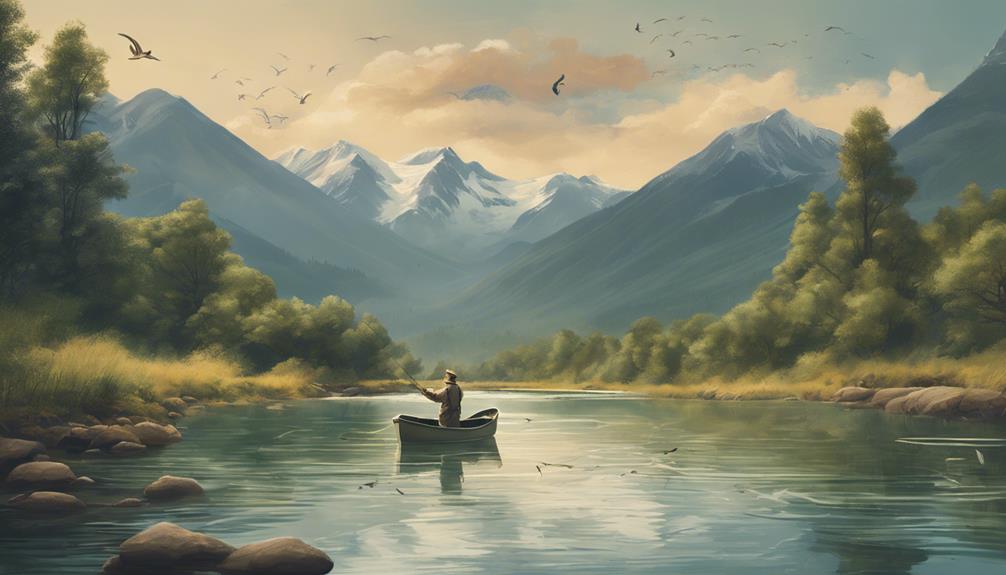
Amidst the interconnected realms of nature and human activity, angling plays a pivotal role in conservation efforts. Anglers often find themselves at the forefront of wildlife preservation, advocating for sustainable practices to ensure the longevity of fish populations and their habitats. Through catch-and-release programs and adherence to fishing regulations, anglers actively contribute to maintaining ecosystem balance and biodiversity.
Angling fosters environmental awareness as anglers develop a deep connection with the natural world. By spending time in the great outdoors, observing the delicate interactions between species and their environments, anglers become staunch advocates for conservation. Their experiences on the water serve as a constant reminder of the importance of protecting and preserving our ecosystems for future generations.
The angling community is instrumental in promoting sustainable fishing practices that prioritize the well-being of aquatic ecosystems. By supporting initiatives aimed at maintaining healthy fish populations, anglers ensure that recreational fishing remains a viable and sustainable activity. Their commitment to conservation not only benefits the environment but also underscores the importance of responsible stewardship.
Angling in Modern Pop Culture
In the realm of modern entertainment and societal trends, angling has found its place in pop culture, influencing various forms of media and shaping contemporary perceptions of fishing practices. The fusion of angling with pop culture has brought about a fresh perspective on this traditional activity, making it appealing to a wider audience.
- Fishing Fashion: Angling has inspired a new wave of fashion trends, with fishing-inspired clothing and accessories becoming popular among influencers and fashion enthusiasts. From fishing vests to waders, the utilitarian aspects of angling attire have been reimagined in stylish and innovative ways.
- Celebrity Endorsements: Celebrities haven't shied away from showcasing their love for angling, with many public figures endorsing fishing gear and accessories. These endorsements have brought angling into the spotlight, making it a trendy and aspirational activity for fans to try.
- Angling in Film and Musical References: Angling has made its mark in popular culture through its presence in films and music. Whether it's a character enjoying a peaceful fishing trip in a movie or a musician referencing fishing in their lyrics, angling has become a symbol of relaxation and connection with nature in modern entertainment.
Frequently Asked Questions
How Has Angling Technology Evolved Over the Centuries?
Angling technology has come a long way over the centuries. From humble beginnings to modern marvels, technological advancements in fishing gear have greatly improved the efficiency and ease of angling.
These innovations have allowed anglers to catch more fish with greater precision and control. The historical significance of these developments showcases how angling has evolved from a simple pastime to a sophisticated sport that continues to thrive today.
What Role Did Women Play in the History of Angling?
Women's participation in the history of angling has had significant historical significance.
Despite gender dynamics limiting their involvement in the past, women have played a crucial role in shaping the cultural influence of angling.
Through their contributions and determination, women have challenged traditional norms and expanded the diversity of anglers, enriching the sport with new perspectives and experiences.
Their presence has been essential in evolving angling into a more inclusive and vibrant community.
How Did Different Cultures Around the World Incorporate Angling Into Their Traditions?
When exploring how different cultures around the world incorporate angling into their traditions, you'll find a rich tapestry of cultural practices and traditional techniques.
Angling has been woven into the fabric of various societies, each adding its unique flair to the art of fishing.
From ancient rituals to modern sport, angling reflects the diversity and creativity of human culture.
Discovering these cultural connections can offer valuable insights into the universal appeal of this timeless pastime.
What Are Some Lesser-Known Environmental Impacts of Angling Throughout History?
When exploring the environmental impacts of angling throughout history, it's essential to consider conservation efforts. Ethical practices and sustainability play key roles in ensuring the longevity of angling traditions.
How Has the Perception of Angling Changed Over Time, and What Controversies Has It Faced?
Over time, the perception of angling has shifted due to societal changes and evolving values. The sport has faced ethical debates surrounding catch-and-release practices, impact on fish populations, and environmental conservation.
Controversies have emerged regarding fishing regulations, commercialization, and animal welfare concerns. As people become more aware of the environment's fragility, discussions around sustainable fishing methods and responsible angling practices have intensified, shaping the way society views this recreational activity.
Conclusion
As you reflect on angling's historical cultural impact, you can see how this timeless activity has woven its way through ancient civilizations, medieval traditions, Renaissance art, literature, social gatherings, conservation efforts, and modern pop culture.
Angling hasn't only provided a source of sustenance and recreation, but has also influenced art, literature, and even conservation efforts. Its rich history and ongoing presence serve as a testament to its enduring significance in human culture.
